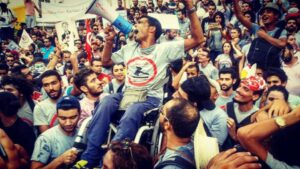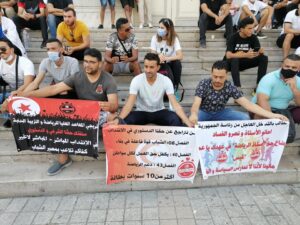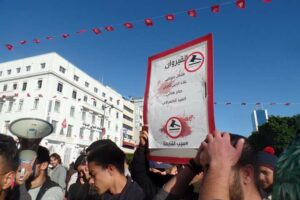Minds of the Movement
An ICNC blog on the people and power of civil resistance
by Matt Gordner and Sara SnoussiApril 28, 2022
A coup d’état is underway in Tunisia that threatens the success of the Arab world’s only democratic hopeful. On July 25, 2021, President Kais Saied used national protests calling for a dissolution of parliament as a justification to invoke emergency law across the country. Under the state of exception, Saied sacked his prime minister, dissolved parliament with military support, and has since silenced journalists, lawmakers, political opponents, and dissidents through a slew of prison sentences, military trials, house arrests, and convictions in absentia.
Alongside the appointment of a new prime minister, Saied terminated and replaced the Supreme Judicial Council, “reformed” the electoral commission, and is moving to close civil society space through security-motivated reforms to the NGO law, including the suspension of all foreign-funded activity under the guise of protections against financing terrorism and corruption. Bulwarks to creeping authoritarianism are functionally non-existent, leaving “the street” as the only option left in a country all too familiar with hashtag protests and social movements.

September 18, 2017. Credit: Manich Msamah Facebook page.
Over the past months, Saied has laid the groundwork for an overhaul of Tunisia’s political system through populist overtures and rule by decree leading up to a July 25, 2022 plebiscite on the constitution. With the economic situation for average Tunisians ever more dire, the president still garners rhetorical support among most Tunisians who have little faith in political parties or trust in the form of democratization that took root following the 2010-2011 revolution. Even though only 10 percent of eligible Tunisians participated in the consultation process supposedly intended to inform the plebiscite, Saied is proceeding apace. Many analysts speculate that he is using the consultation process and plebiscite to institute his vision of “local councilism”—an experiment in direct democracy with a heavy-handed role for presidential decision-making. Yet his track record of using undemocratic means to ostensibly democratic ends are cause for concern.
Thus far, Tunisian “democracy” has produced little beyond elections and freedoms of speech and assembly—and even those were frequently and arbitrarily assaulted over the past decade. Rather than overturning class dynamics and instituting truly revolutionary change, political elites returned Tunisia’s economy to the same neoliberal model that helped spur the 2010-2011 revolution in the first place. Much of the problem stems from the fact that the principal cadre of youth-led revolutionaries who struggled for genuinely democratic practice in the early years of the revolution were quickly sidelined from law and policymaking, leading to deepening forms of “NGO-ization.” The long-term effect was “business as usual” under the guise of performatively democratic governance unresponsive to civil society policy recommendations.
New organizing amid civil society divisions
In response, prominent civil society leaders have refused to acknowledge that the past decade represents anything close to genuine democratization. As human rights activist Rami Khouili told us during an interview about the January 14th, 2022 protests marking the erstwhile anniversary of the Tunisian revolution:
“Going back to the 24th of July [the day before the coup] is impossible. We want to build a democratic system, and a sustainable one. A new system that is representative with human rights. What we were living was not a democracy anyways… Today, some of the people, including [the Islamist party] Ennahda and other political parties that governed the country, and who did not reform the security sector, are now the victims of that same system. We warned them that they would one day regret not taking the necessary steps to reform the police sector and the justice system.”

September 14, 2021. Credit: Manich Msalmin Facebook page.
Caught between a rock and a hard place, civil society is divided. While, on the one hand, many supported the need for a drastically new path, the assumed risks—deepening authoritarian practices—manifest daily, rendering red lines difficult to draw. The new political context has given rise to some new movements alongside established ones. For his part, Ramy Khouili was one of a hundred longstanding activists, journalists, academics, lawyers, and professionals to sign a petition calling out the shrinking spaces in which civil society can operate. Their January 14th, 2022 action, initially planned for Tunisia’s downtown Bourguiba Avenue, was redirected when police cordoned off the area in anticipation of massive protests. In response, Khouili quipped on Faceboook: “A new world record was broken by Tunisia this morning on Bourguiba Avenue: the largest concentration of police per square meter in the world.” That protest was ultimately dispersed via water cannon, detentions, and arrests.
A new movement called “Citizens Against the Coup”, established in the capital in August 2021 gained prominence among a cross section of political parties and activists. They consider Kais Saied’s government illegitimate for having contravened the constitution and have called for a boycott of the upcoming constitutional referendum. Their nonviolent tactics feature street demonstrations, culture cafes (theatrical performances, songs, and spoken word), and symbolic hunger strikes.
Another new movement—Manich Msalmin (“We Do Not Give Up”), considers the events of July 25th, 2021 a “necessary event” but are critical of Saied’s policies. Many of its members hale from Manich Msemah (“We Do Not Forgive”), the anti-economic reconciliation movement of 2015 that opposed the government’s amnesty of corrupt politicians and bureaucrats. Whereas Manich Msemah was criticized for its organizational inefficiencies in proponing horizontality as its decision-making structure, leadership within Manich Msalmin appears ready to learn from those experiences in making concrete policy proposals and streamlining their governance structure—though they have yet to take considerable action. With that said, Manich Msemah’s innovative nonviolent tactics and creative campaigning—“Wanted” signs for corrupt politicians, adapting slogans from cartoons and football stadiums, cultural and intellectual forums like slam poetry, jam sessions, and invited speaker series—resonated with average Tunisians, leading to a partially successful outcome.
Remaining challenges and future directions

January 13, 2017. Credit: Manich Msamah Facebook page.
Despite these collective efforts, significant challenges remain. For one, legacies of authoritarianism run deep throughout the police and Ministry of Interior. In the past, nonviolent campaigns over resource allocation, jobs, austerity measures, and the amnesty of corrupt officials were met with repressive measures, divide-and-conquer, and cooptation —with no ramifications for the security officials involved. For another, Tunisia’s premier civil society organizations appear to have been unable to, or have been too slow to establish a concerted presence on the street or in the public sphere.
A more longstanding issue concerns institutional memory: a generational divide exists between youth borne of the 2010-2011 uprisings and those most active today who weren’t cut from the cloth of 2010-2011. Though perhaps more militant, the new generation takes a more anonymous approach on social media, leaving little room for the cultivation and development of public leadership. Many youths in Tunisia maintain a disdainful view of formal party politics. This threatens the establishment of a next generation of politicians much needed in a country chalked full of political parties without coherent and sophisticated political platforms and staffed by Ben Ali-era politicians who still occupy many seats in parliament.
What’s next in the push for democratization in Tunisia? Civil society and nonviolent movements need to do a better job of informing ordinary Tunisians of the dangers ahead. Working in concert and across classes and identity politics to bring genuinely pro-democracy forces together—whether on social media or the street—will be essential. A new coalition of civil society groups and political parties called the “National Salvation Front” are attempting to push back against the president’s plebiscite. Yet many prominent youth activists refuse to join them given that these same political parties represent the ills of the democratic transition thus far. Calling directly upon the international community to, for example, withhold aid to the Tunisian government and military can be an effective tool to pressure Saied and his cronies to get on the right side of history. Thus, far, the response of pro-democracy nations has been tepid and underwhelming at best. Whether Tunisian history will be told as a story of democracy or naught will be decided in the coming months—enough time for civil society to prepare a concerted response, albeit cutting it very close.

Matt Gordner
Matt Gordner is a PhD Candidate at the University of Toronto (Canada) where he studies comparative and development politics with a regional focus on the Middle East. Matt is a Tunis-based development and democracy consultant and award-winning academic and community organizer whose doctoral research is supported by a Pierre Elliot Trudeau Scholarship, American Political Science Association Civil Society Fellowship, and Connaught Fellowship, among others.
Read More
Sara Snoussi
Sara Snoussi is a development and democracy consultant who advocates for youth inclusion and empowerment through social innovation and entrepreneurialism. Sara is Fundraising and Business Intelligence Manager at Open Startup Tunisia, an organization that promotes youth entrepreneurship in the MENA region. As a Fulbright Scholar, Sara earned a master’s degree in International Studies from North Carolina State University and Duke University.
Read More